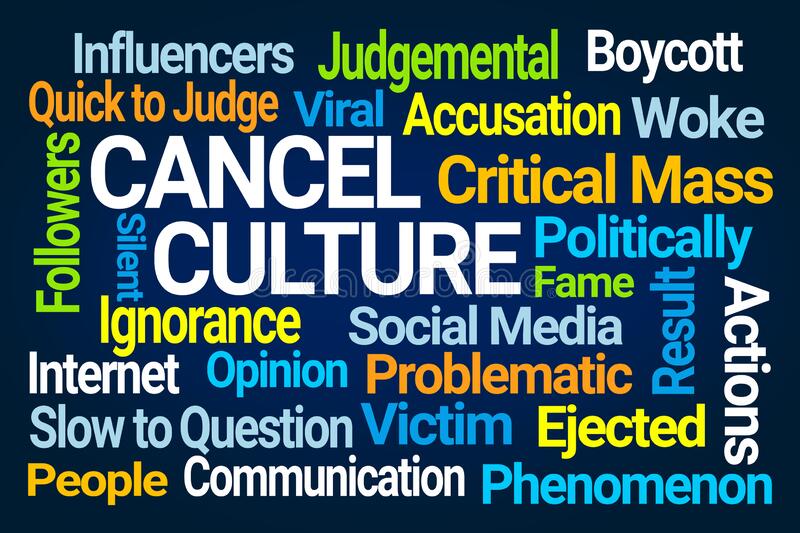The Consequences of Cancel Culture
“Cancel Culture” has taken the world by storm over the past few decades. Although the movement may have started with good intentions, many people are slowly starting to realize the dangers of the poorly executed concept that many are not willing to talk about.
This image shows many words that are associated with Cancel Culture.
“Celebrity” is a desirable position that many humans aspire to claim, but only some people can actually achieve. Whether a celebrity is famous for simply being famous, or they have an exceptional talent that sets them apart from other people, celebrities are often held to a higher standard than the average person because of their influence.
Although many people around the world crave the superiority that being a public figure can give them, the amount of pressure that is put on celebrities to maintain this god-like image is extremely high because a large part of being a celebrity is being a role model to your fans and followers.
Because of this, it is not expected of celebrities and public figures to make any type of severe mistake that would in any way taint their image.
But what happens when they do?
This is where Cancel Culture comes in to play. Cancel Culture started as a way to hold celebrities accountable for their actions, but over the past few years media consumers have noticed that cancel culture has taken a turn for the worst.
Now, many people are against Cancel Culture because it is used as justification to judge, bully, and isolate a celebrity that—in some cases—they never liked to begin with, all in the name of “holding people accountable.”
This shows that the dangers of cancel culture are dependent upon the motives behind canceling a certain celebrity or public figure.
In order to establish the difference between the two motives, there are a couple of older examples that show how Cancel Culture can have two separate outcomes.
In the late 90’s and the early 2000’s, the Country Music band The Dixie Chicks won over the hearts of many country music lovers. They were extremely talented, great at harmonizing, and brought a new element to country music that set them apart from many artists.
They were finally starting to get positive attention from listeners, but their influence quickly went down-hill once they criticized former Republican president, George W. Bush, for his role in the Iraq invasion.
On March 10, 2003, the Dixie Chicks were doing a performance in London when lead singer, Natalie Maine, said “Just so you know, we’re on the good side with y’all. We do not want this war, this violence, and we are ashamed that the President of the United States is from Texas.”
Shortly after, their own fans began trashing their CD’s, criticizing, and slut-shaming them which can all be found in the videos here.
The irony in this whole situation is two years ago the Dixie Chicks sold out their reunion tour after their tumultuous downfall, while these days George Bush is heavily looked down upon for the Iraq invasion.
Despite this, there are good representations of cancel culture.
Around 11 years ago at the MTV Video Music Awards, Taylor Swift was gifted an award for the female video category over another iconic singer, Beyonce, for her classic country-pop song, You Belong with Me.
During Swift’s acceptance speech, rapper Kanye West interrupted her by saying, “Yo Taylor, I’m really happy for you, I’ma let you finish, but Beyoncé had one of the best videos of all time.”
This tone-deaf act by West was met with a lot of disapproval from the audience, Swift, and Beyoncé herself.
By the end of the night West apologized via Twitter for his actions against Swift, but he faced a lot of criticism from both fans and celebrities including Katy Perry and Kelly Clarkson.
Although in the near future West would continue to have conflicts with Swift, the act of Cancel Culture worked the way that it was intended to because West was held accountable and given the time to apologize and grow from his mistakes.
These two examples of the two sides of cancel culture happened about ten to twenty years ago before the term “Cancelled” was coined, but these two situations expose both the benefits and dangers of cancel culture.
At the end of the day, nobody is arguing that celebrities need to be held accountable, but we need to take a deeper look at how cancel culture can make or break a celebrity’s image.
Until we correctly hold celebrities accountable, innocent celebrities will continue to suffer, and fans of problematic celebrities will have to clean up the mess that is not theirs to clean.

Daryn O'Neal is a senior who serves as the this year's Column editor. She loves to Dance, shop, and visit any and every restaurant life as to offer.
Favorite...



